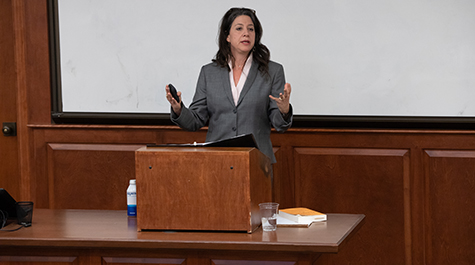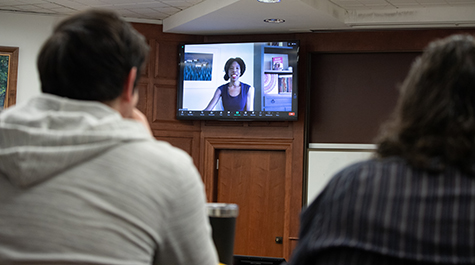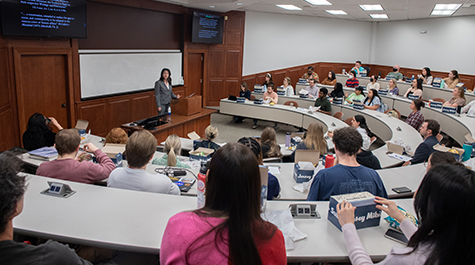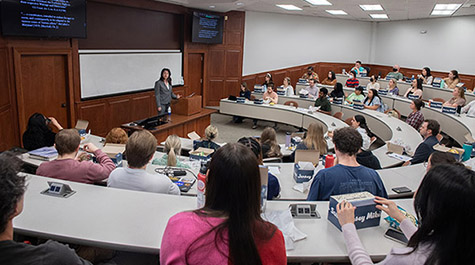Professor Jessica Silbey Presents Annual Mervis Lecture in Intellectual Property
Jessica Silbey, Professor of Law and Yanakakis Faculty Research Scholar at Boston University School of Law delivered the 2022–2023 Stanley H. Mervis Lecture in Intellectual Property on February 10 at William & Mary Law School. Patricia A. Banks, Professor of Sociology at Mount Holyoke College, offered commentary.
In her talk, titled Against Progress: Intellectual Property and Fundamental Values in the Internet Age, Silbey questioned the concept of “progress” as highlighted in the U.S. Constitution, which authorizes Congress to enact copyright law and patent law to “promote the Progress of Science and useful Arts.” Tracing a long line of Supreme Court cases across patent law, copyright law, and trademark law, Silbey highlighted the expanded notion of what kinds of creation can be considered protectable under intellectual property, from Diamond v. Chakrabarty’s statement that “everything under the sun that is made by man” can be patentable, to Bleistein v. Donaldson Lithographic Co.’s caution that it would be a “dangerous undertaking for persons trained only to the law” to deem themselves the ultimate arbiters of what constitutes art; to Qualitex Co. v. Jacobson Products Co.’s view that there is a broad universe of things that can qualify as trademarks beyond words and logos, including color, sounds, and scents.
Such expansion, Silbey suggested, leads to a notion of progress that aligns with ideas of abundance, choice, and the free market — enabled by the freedom and generativity that the Internet fosters.
“But what is IP for today?” Silbey asked. “Could it be for something else?” Rather than being simply about markets and money, she noted, the concept of intellectual property now “is being infused with fundamental values and essential democratic principles,” such as equality, privacy, distributive justice, and institutional resiliency.
Silbey offered several contemporary examples to illustrate her point: the famous “monkey selfie” case, which asks what it means to be an author; cases involving objections by those appearing in photographs to the use of those photographs to promote controversial or offensive ideas; and Bowman v. Monsanto, which raises questions about whether there should be limits on how much benefit a patent holder can derive from a patent.
Silbey concluded by highlighting the view of creators she had interviewed as part of her research. Many of those creators, she noted, value mutual flourishing and civility; they resist a “winner take all” approach to intellectual property, characterizing that approach as “coercive” and involving “shakedowns.” These interviews, in conjunction with the court cases she discussed, have challenged her to think about “the contours of intellectual property for the Internet age.”
 In her commentary, Banks, appearing virtually, emphasized the importance of intellectual property in the accumulation of “diversity capital,” such as when companies sponsoring Black events offer photo backdrops for attendees. Those backdrops often prominently feature the company’s logo; when the photos taken by eventgoers are then posted on social media the eventgoer has —perhaps unwittingly — been co-opted as a contributor to the company’s brand value.
In her commentary, Banks, appearing virtually, emphasized the importance of intellectual property in the accumulation of “diversity capital,” such as when companies sponsoring Black events offer photo backdrops for attendees. Those backdrops often prominently feature the company’s logo; when the photos taken by eventgoers are then posted on social media the eventgoer has —perhaps unwittingly — been co-opted as a contributor to the company’s brand value.
“Should firms pay more when their sales are especially dependent on racial and ethnic minority consumers?” asked Banks. “Should payment depend on factors such as whether or not a firm has experienced a racial image crisis and is in particular need of image repair?”
In addition, noted Banks, encouraging eventgoers to take their own photographs and then post them on social media may create a system where professional photographers who are likely more aware of their IP rights are replaced with amateur photographers who might be more likely to sign away those rights.
“This year's Mervis Lecture challenged me to consider who is benefiting from the claim of ownership in IP,” said 3L Amanda Stevenson. “Professor Silbey highlighted how IP law, particularly as it is being impacted in the Internet age, is not always aligned with the expectations of creators and how they relate to their work and ideas.”
In thinking about how to move these conversations forward, both scholars noted the importance of bridging communities. Banks noted that there is now more conversation about some of the ways that market processes can reinforce racial inequality, although, she pointed out, it may take a particular moment to bring these issues to the forefront. Silbey, for her part, noted the importance of local change, drawing on her expertise as a constitutional scholar. “Community by community,” she said, “is going to be the way that we actually make enduring change protecting human rights and values.”
Silbey is Professor of Law and Yanakakis Faculty Research Scholar at Boston University School of Law, where she teaches and writes in the areas of intellectual property, constitutional law, and law and the humanities, as well as about the use of film as a legal tool and the representation of law in popular culture, drawing on her Ph.D. in comparative literature. Her previous book, The Eureka Myth: Creators, Innovators and Everyday Intellectual Property (Stanford University Press 2015), based on interviews with authors, artists, inventors and lawyers, challenged the traditional notion of intellectual property as merely creating financial incentives necessary to spur innovation.
In 2018, Silbey received a prestigious Guggenheim Fellowship, which enabled her work Against Progress: Intellectual Property and Fundamental Values in the Internet Age (Stanford University Press 2022), on which the lecture was based.
Banks is Professor of Sociology at Mount Holyoke College and also holds appointments in the Program of Africana Studies and the Program in Entrepreneurship, Organizations, and Society. Focusing on the African Diaspora, she studies the meanings of cultural consumption and the processes underlying the emergence and growth of cultural markets, including the bi-directional relationship between art collecting and identity and structural and cultural explanations of museum philanthropy. She is the author of several of books, the latest of which is Black Culture, Inc.: How Ethnic Community Support Pays for Corporate America (Stanford University Press 2022).
About the Mervis Lectureship
The Stanley H. Mervis Lectureship in Intellectual Property was created in memory of Stanley Mervis in 2003 by his family and friends. Mr. Mervis, a member of the William & Mary Law School Class of 1950, was patent counsel for Polaroid Corporation for most of his career and was actively involved in important patent and intellectual property issues.
Other notable individuals in intellectual property law who have given recent Mervis Lectures include Professor Mark A. Lemley (2016); the Honorable Pierre N. Leval, U.S. Court of Appeals for the Second Circuit (2018); Paul Grewal (2019); the Honorable Kathleen M. O’Malley (ret.), U.S. Court of Appeals for the Federal Circuit (2020); and Professor Colleen Chien (2022).
